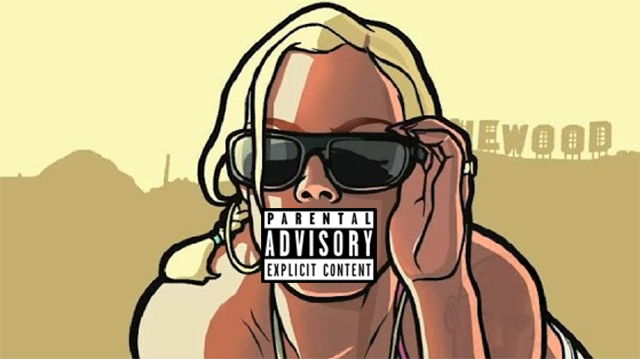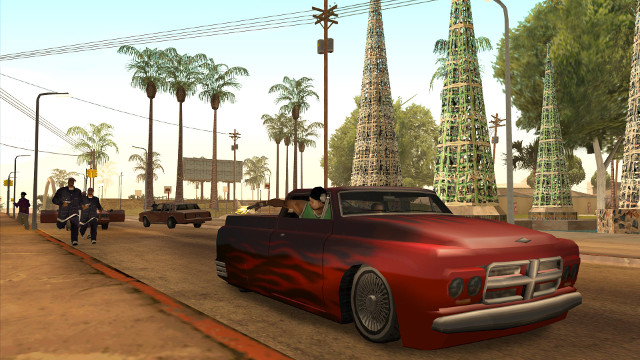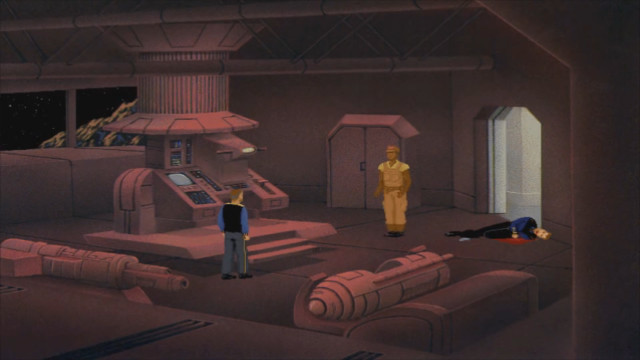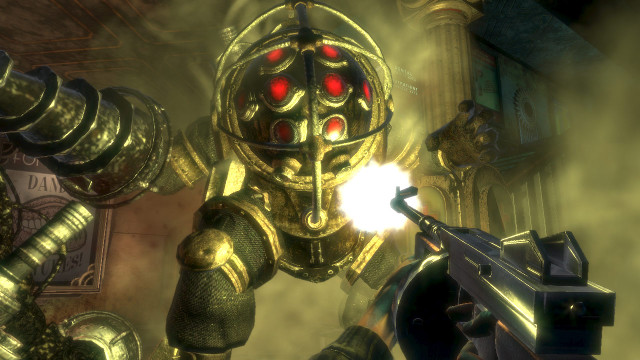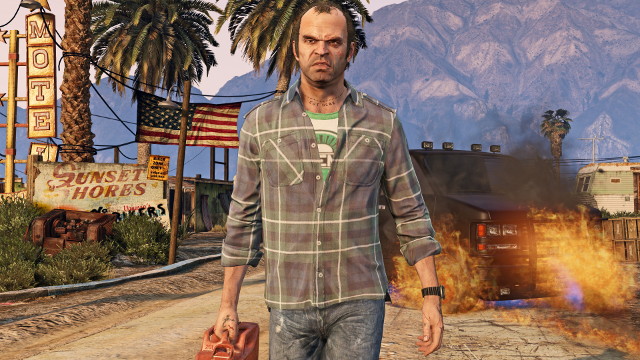“What the f*** you want from me this time?” said Carl “CJ” Johnson in the opening moments of GTA: San Andreas, changing the face of gaming forever. It seems like a somewhat innocuous (albeit coarse) sentence in today’s terms. But back in 2004, it was revolutionary.
GTA: San Andreas broke the f-bomb barrier in a big way
Fans of GTA: San Andreas (and the Grand Theft Auto games in general) are so dedicated that they’ve essentially wrote out the entirety of the game’s dialogue. When we keep it to the Grand Theft Auto franchise, there is a clear line between Vice City and San Andreas.
ALSO: Death Stranding’s biggest problem is that it doesn’t look fun
The fan-transcribed script for GTA: Vice City shows 17 uses of the word “s***” and zero uses of the word “f***”. San Andreas‘ script, in comparison, has 206 instances of the s-word and 247 instances of the f-bomb. This includes the still-popular meme where CJ walks down an alley, stating, “Oh, s*** — here we go again.”
There is a clear line in language between the two titles. At some indeterminate point following the conclusion of Vice City, the fine folks at Rockstar decided that they were going to make the language in the next big GTA game a lot less family-friendly. And frankly, we’re all the better for it.
San Andreas wasn’t the first, but it was probably the biggest
To be clear, GTA: San Andreas was not the first video game to drop the f-bomb. YouTuber DanDan Trivia looked into this a little over five years ago and found a handful of smaller games that got away with it in the ’90s, but none of them were on major consoles like the Grand Theft Auto games were. Amusingly, one of these early uses of the word was in a cut voice line from an early Discworld video game.
“I want to be the first person in the game to say ‘f***’,” the cut line said. While it apparently hadn’t made its way into the game proper uncensored, it was nonetheless included in the sound files. It was a rather Pythonesque approach to a naughty word, much like how John Cleese was the first person to say “f***” at a British memorial service while delivering his hilarious eulogy at Graham Chapman’s funeral.
The 1995 adventure game The Orion Conspiracy, however, said the fantastic foul word in question in the open and uncensored, beating GTA: San Andreas by nearly a decade, although not on a gaming console like a PlayStation or Xbox. While these instances represented small cultural shifts in the case of humor, GTA: San Andreas wasn’t as goofy. Sure, there were funny bits of coarse dialogue in the game, but the vast majority were more serious. For the first time in a big game, the gangsters talked like gangsters.
A dramatic change in language
Game companies have always been somewhat conservative about the entertainment they’ll allow to be published, at least when it comes to consoles. In a sense, they’re behind movies and books by a decade or more in some cases, and language has been no different.
The shift in linguistic tone between GTA: Vice City and GTA: San Andreas showed that a big enough game could get away with foul language. Again, it wasn’t the first game to do it, and it may not have even been the first popular game to do it, but it was the first popular game to do it in a big way. Suddenly, developers had license to make their scripts a little less Big Bang Theory and a little more Boardwalk Empire.
Take a look at the fan-transcribed script for Bioshock, first released in 2007: 10 instances of the f-word. It pales in comparison to that of a game released three years earlier, but they’re nonetheless present. This is representative of a trend that would continue through to today — but not everyone got on board right away.
Borderlands 3’s ‘big f***in’ dinosaur’ and the late bloomers
San Andreas showed a level of maturity that other mature games are just starting to get to, despite their rating and subject matter. Borderlands 3 is one of those games. For all the silly memes and jokes in Borderlands 2 that try to be what a 13-year-old considers to be “mature,” it entirely avoided saying “f***” as far as I can tell in my research. There is one notable line said by Mr. Torque seen in the video above, but the magical word in question is censored with a bleep. This changed entirely with the launch of the hotly-anticipated sequel. Perhaps it was the inclusion of longtime rapper (and video game fan, naturally) Ice-T that got it done, or maybe it was something else entirely, but the use of the f-word went from unacceptable to acceptable at some point in between the two games.
Mortal Kombat is another example. For all of its violence, the series never had naughty language: just guts and gore. Mortal Kombat X and Mortal Kombat 11 both recently embraced swear words, mainly through Johnny Cage’s pretty but punchable mouth. And Cage’s dirty tongue didn’t come until about 23 years after he decapitated his first opponent.
Amazingly, it took a long time after the adventures of CJ and the Grove Street gang before Gearbox Software and NetherRealm decided that the open use of coarse language in their mature games was acceptable. Bear in mind that Borderlands 2 launched way back in 2012, a full eight years after GTA: San Andreas dropped the f-bomb and 11 before Mortal Kombat X. Hell, San Andreas didn’t even drop it — it carpet-bombed the player throughout the whole experience.
Perhaps it was the Hot Coffee controversy that caused some other developers to be a little hesitant about using more adult language. Whether it was that or something else, it took years for these teams to catch up with a barrier that Rockstar Games sledgehammered through with GTA: San Andreas.
Why the f*** is this important, anyway?
Why does the use of adult language matter in games, anyway? It’s seen as immature by some, and that’s not necessarily an incorrect assessment. Others may be offended by its use, whether on moral grounds or otherwise. So why is it so gosh darn important for gamers to hear heckin’ mean language?
The first and most evident reason is realism. Spend a few minutes listening to an honest-to-goodness criminal talking and you’re going to hear more curse words than a full season of Jerry Springer. The Sopranos and The Wire are accurate representations of the kind of language you can expect to hear from criminals of various stripes, and a game that lacks this parity in foul language feels less realistic. There’s also the humor element. A well-timed “holy s***” or “what the f***” is can steal the show if done correctly.
Lastly, and perhaps most importantly, it’s a sign of games treating us like adults. Gaming is a broad medium, appropriate for everything from six-year-olds to 60-year-olds and beyond. I don’t like to be treated like a kid, and I’m sure many other adults don’t, either. And obviously not every game is going to have swearing but it shows that gaming can mature with its audiences and be skewed towards people who aren’t kids or teens.
GTA: San Andreas was a major contributor towards breaking the language barrier expanding who games were made for. Some developers and franchises are still playing catch-up to a trail that Rockstar Games blazed 15 years ago and are getting there, slowly but surely. And 15 years from now, we’ll be talking about some other seemingly small things that a video game did finally did that had already been done by movies and television for decades. It’s the evolution of a f***ing medium, after all, and only a few games like San Andreas get to have that chance to a make a f***king difference like that.
